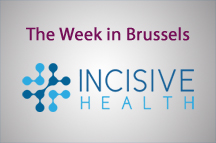 This week was mini plenary time at the European Parliament in Brussels. The key point on the agenda: the future budget of the EU.
This week was mini plenary time at the European Parliament in Brussels. The key point on the agenda: the future budget of the EU.
European Commission President Juncker kicked off the process himself this Wednesday by presenting the Commission proposal for the new Multiannual Financial Framework (MFF). The most obvious challenge: Brexit and how to put together a budget for a smaller EU. In the end, the Commission proposed a bigger budget of some €1.279 trillion for the 2021 to 2027 period.
In terms of health spending, feelings are mixed: while the health programme will be subsumed under the broader European Social Fund together with employment and social innovation, it will not be integrated into a programme under the single market, as Brussels health NGOs had feared. Some €1.17 billion will go into the social fund over the seven-year period. We will know only on 29 May just how much of this budget will go to health when the programme-specific proposal will be presented, but guesses are that it will be less than the current €500 million.
On a more positive note, the Commission proposal includes a 64 percent increase in funds allocated for research, innovation and digital – fields that the Brussels health community is equally interested in. The new EU research programme Horizon Europe will get €97.6 billion – a rise of 27 percent from the current programme. This includes research on health, but just how much also remains to be seen.
 MEPs had called for at least €120 billion dedicated to research, as had the research community and civil society. Thus, while the increase is welcome, it falls short of expectations. The Parliament’s resolution also underlined the added value of European collaboration in public health – an assessment echoed in the call for strong EU leadership on health by leading health NGOs.
MEPs had called for at least €120 billion dedicated to research, as had the research community and civil society. Thus, while the increase is welcome, it falls short of expectations. The Parliament’s resolution also underlined the added value of European collaboration in public health – an assessment echoed in the call for strong EU leadership on health by leading health NGOs.
Money was also high on the European Medicines Agency’s (EMA) agenda this week with the Commission opening a public consultation on the agency’s fee system. The questionnaire is part of a wider evaluation which seeks to uncover whether the current system is “cost-based, fair, proportionate and not unduly complex”.
And finally, Belgian Health Minister Maggie De Block was talking drug pricing at a think tank event assessing the benefits – and pitfalls – of joint pricing negotiations under co-operations such as BENELUXA. The initiative already includes Belgium, the Netherlands, Luxembourg and Austria and will be extended to include Ireland in the near future.
The takeaway from this week: at the end of the day, all that money talk is not ‘just’ about money, it is about EU added value.














